|
|
|
Sort Order |
|
|
|
Items / Page
|
|
|
|
|
|
|
| Srl | Item |
| 1 |
ID:
129603
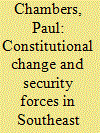

|
|
|
|
|
| Publication |
2014.
|
| Summary/Abstract |
Achieving civilian control of security forces through constitutional reform processes has been a major challenge for young democracies or democratizing countries in Southeast Asia. In many cases, governments seeking to establish or consolidate civilian control have been faced with coups d'état or the threat of coups. The successful enshrinement of laws reining in security force adventurism has often accompanied compromises which at most provide militaries with considerable latitude in their areas of decision-making or at least protect soldiers from judicial prosecution. Ultimately, the constitutional incorporation of security forces into embedded political life is no easy task. This article examines two country cases of "defective" democracies. In each case, security forces have moved towards becoming more integrated under the constitutions of civilian-led regimes. This study poses four questions. First, how did the institutionalization of security forces under civilian-led constitutions occur? Second, how did these experiences vary? Third, to what extent do these security forces today possess differing degrees of enshrined powers? And fourth, based upon these experiences, how might civilian control be sustained over time? The article argues that constitutional change acceded to by security forces more often than concessions by civilians. However, the initial bargain can later transform itself towards more or less security force interventionism depending upon three variables: the heritage of authoritarianism; the relative unity of civilians as opposed to the security forces; and threat environments.
|
|
|
|
|
|
|
|
|
|
|
|
|
|
|
|
| 2 |
ID:
066722
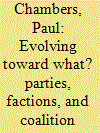

|
|
|
| 3 |
ID:
180074
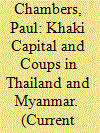

|
|
|
|
|
| Summary/Abstract |
Military-run business activities can turn into an unrestrained form of parasitic capitalism, preying on national economies. The militaries of Thailand and Myanmar have evolved as predatory “khaki capitalist” institutions. Thailand’s military, deriving its legitimacy as guardian of the monarchy, has used that role to justify its accumulation of economic resources. Myanmar’s military, in power for most of the decades since independence, has invoked national security to expand its budget and business interests. Both militaries have repeatedly employed coups to consolidate their economic power, most recently in 2014 in Thailand and 2021 in Myanmar. Fragile democratic governments and international sanctions have proved ineffective in restraining them.
|
|
|
|
|
|
|
|
|
|
|
|
|
|
|
|
| 4 |
ID:
120964
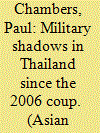

|
|
|
|
|
| Publication |
2013.
|
| Summary/Abstract |
In contemporary Thailand, achieving effective civilian control of the armed forces is a daunting challenge. The country's long series of military coups are one outcome of the operational independence generally enjoyed by the military. In most cases, these military interventions have sought to support the political ambitions of the palace and its networks. For almost a decade, Thai politics has been polarized by reactions to the electoral success of former Prime Minister Thaksin Shinawatra and his perceived threat to military and royal power. The military has thus acted as arch-royalist "protector," helping itself to enhance its political status in a monarchy-led parallel state. This paper examines how and why the armed forces continue to remain powerful in Thailand and what prospects exist for diminishing this clout in the messy aftermath of the 2006 coup.
|
|
|
|
|
|
|
|
|
|
|
|
|
|
|
|
| 5 |
ID:
114747
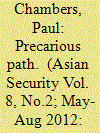

|
|
|
|
|
| Publication |
2012.
|
| Summary/Abstract |
In the Philippines, the armed forces have played a major role in the country's authoritarian past. Yet despite the advent of democracy, vestiges of authoritarianism have continued to linger. This article analyzes the successes and failures in the efforts of Philippine civilians to gain authority over their military in five areas of political decision making, with the objective of achieving consolidated democratic rule. The article argues that in the Philippines, civilians have made genuine progress in curtailing the influence of military in certain areas, while in others, the armed forces continue to challenge civilian prerogatives. The article concludes that the ability of the Philippine military to continue acting in breach of civilian supremacy in certain areas reflects an impediment to democratically elected authorities' power to govern effectively.
|
|
|
|
|
|
|
|
|
|
|
|
|
|
|
|
| 6 |
ID:
100578
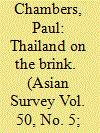

|
|
|
|
|
| Publication |
2010.
|
| Summary/Abstract |
Thailand's current partisan turmoil is paralleling growing authoritarianism and democratic decay. This article examines contemporary Thai civil-military relations, the state of armed forces unity, and potential outcomes. It argues that amid heightened political uncertainty and diminished democracy, the only surety today is an enhanced role for Thailand's armed forces.
|
|
|
|
|
|
|
|
|
|
|
|
|
|
|
|
| 7 |
ID:
175409
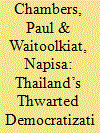

|
|
|
|
|
| Summary/Abstract |
In 2019, Thailand represents the case of an Asian country overshadowed by authoritarian forces, though it has time and again experienced attempts at democratization. This paper argues that democracy remains deficient in Thailand because, though there have been enormous advances in terms of the economy, social improvements and state stability, political space remains elusive and dominated by the monarchy and military. State formation in Thailand is a function of how entrenched social stratification has been reflected in a highly skewed distribution of economic resources. The paper asks the following five questions: First, why has Thailand, which appears to have become relatively strong in terms of economic and political stability, been unable to achieve democracy? Second, what has been the evolution of democracy versus authoritarianism in Thailand? Third, how have the linkages among state structures, economic relations and societal institutions evolved across time in Thailand? Fourth, what are the main features of their historical development today and how have these (as conditioned by domestic and international factors) affected Thailand’s political conditions? Fifth, what is the likely future of Thai democracy?
|
|
|
|
|
|
|
|
|
|
|
|
|
|
|
|
| 8 |
ID:
131307
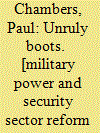

|
|
|
|
|
| Publication |
Frankfurt, Peace Research Institute frankfurt, 2013.
|
| Description |
iv, 37p.Pbk
|
| Series |
PRIF Report No.121
|
| Standard Number |
9783942532549
|
|
|
|
|
|
|
|
|
|
|
|
Copies: C:1/I:0,R:0,Q:0
Circulation
| Accession# | Call# | Current Location | Status | Policy | Location |
| 057772 | 355.0309593/CHA 057772 | Main | On Shelf | General | |
|
|
|
|
|
|
|
|
|